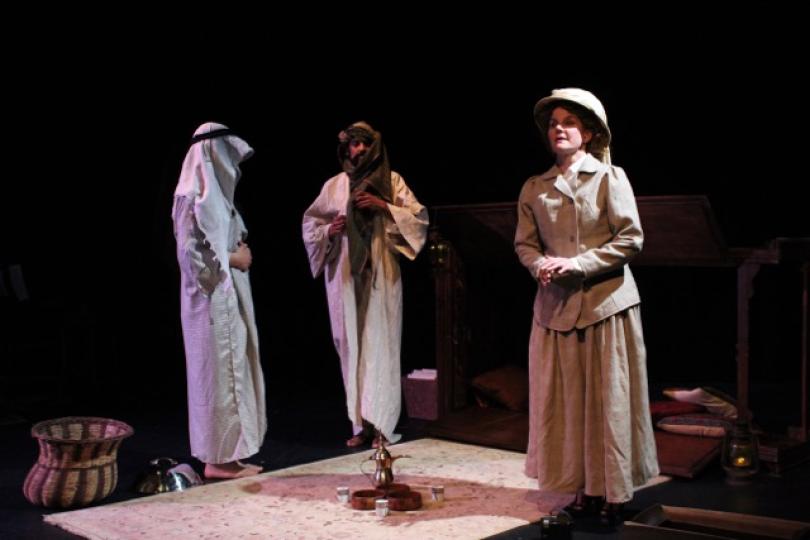Building a nation and a person

When people travel, especially in long-term installments, we splinter ourselves into more and more identity fragments. Dear friends will settle in all corners of the world. Brains will retain pathways forged by new languages. Favorite foods will never again live in the same city.
This is a postmodern view on personal experience. Splinters and commotions abound in today’s Western worldview, but postmodernism is a relatively new school of thought. A hundred years ago, modernism reigned supreme, and it pretended quite the opposite endgame; instead of conflict, it believed in harmony. Instead of splinters, it sought wholeness of self.
When Trista Baldwin’s new play Eye of the Lamb picks up with English explorer/writer Gertrude Bell, played by Annie Enneking, she is chasing wholeness and “Personhood.” In fact, in typical modernist form, she often equates them. She’s living in Baghdad in the 1920s, and the British government is pushing an Anglo-Iraqi Treaty, which would grant Iraq British support against the Turks; it would also grant Britain vast commercial rights and military chess pieces. Bell is the unusual political figure who smoothes relations between her native and adopted countries.
Other main characters include Percy Cox and Henry Dobbs—English diplomats both played by Pearce Bunting—as well as Marie, Bell’s French maid (Taous Claire Khazem). Each of these characters mainly exists to further British colonialism, whether they like it or not. And as the play progresses, we see Bell asserting her own independence even as she aids and abets imperialism. The program says that she “drew the borders of Iraq,” but that piece of her work was mostly left out of the play; the whole narrative is a mostly chronological account of her daily life in Iraq.
Attention to Orientalism
Eye of the Lamb knows its subject matter’s history and systems incredibly well, as far as I understood. It shows Bell’s ethnocentrism even as it lets her feel more at home in the Middle East than she did in England. As soon as Bell sings the word “Oriental” in the fourth phrase of an opening song, she calls attention to Orientalism, or the idea that non-Europeans were fundamentally different from (read: worse than) Europeans. The ideological cues are there to be picked up on.
In fact, Eye of the Lamb hits on a key tenet of Orientalism when it shows Bell photographing others. During a meeting with a sheikh, Bell wonders, “I wonder if he’s seen a camera.” The aside itself makes the sheikh look uninformed—after all, he can’t hear Bell’s remark. “Would you like a portrait?” Bell then asks him directly, and she clicks the shutter before the sheikh can reply. Traditionally, the camera represents the colonizer’s gaze—see The Colonial Harem, a flawed but illuminating postcard collection compiled by Malek Alloula—so it’s brutal to see Bell snapping shots here.
After centuries of being status symbols in desert climates, gardens came up several times in the play; the resources needed to grow plants in dry climates are immense, so of course Bell would relate to King Faisal I about greenery. She talks about her “chamomile, privets, and violets”—the latter two of which are non-native to Iraq, as far as I can tell—and when she talks of those plants, the audience can see Britain claiming hegemony over the earth’s very soil.
The personal is political
As Bell almost explicitly states during the play, the personal is political. The personal is also where the script falls a bit short, dragging out Bell’s relationship issues to the point of staleness. Bell holds her former guide, Fattuh, in high regard, and she’s disturbed by the fact that his association with her brought on his torture. Actor and multi-instrumentalist Munikantha Kulasinghe plays him onstage. Even closer to Bell’s heart is Dick Doughty-Wylie, a married, late love interest. But with no Doughty cast in the play and lots of time spent on his absence, their love story feels less star-crossed than boring.
The most gripping relationship, I thought, was shared by Bell and Marie. Bell claims ownership over her maid more than once—“You can’t have her, because she’s mine,” goes the oft-repeated, somewhat comedic line—but near the play’s end, Bell is surprised to learn that their bond does not go as deep as she imagined. “I hope you don’t hate me for chaining you to this heat,” Bell says. When Marie does not refute her, Bell gets more desperate, pleading, “Don’t hate me for it.”
Throughout the play, the audience understands that Bell loves camels, adventure, and date scones. But she isn’t shown to care much about the people of Iraq. It’s more about her “Personhood,” her wholeness and her future, than the nationhood of the new country. In fact, she tries to fit Iraq into the mold she thinks will bring her peace. The contradiction of being colonizer and ally, which Baldwin mentions in the program’s “Note from the Playwright,” is tricky to convey, but it comes across clearly here.
Music and more good news
A four-piece “Baghdad Cafe Band” brings lovely melodies to the play, often underscoring dramatic moments, and the set is wonderfully versatile. Costumes by Lisa Conley suit the characters well, and the desert sun shines through Heidi Eckwall’s yellow-blue lighting.
More good news: the play is still in progress, so before it tours, Baldwin and director Jeremy Wilhelm are looking to polish it up. Audience members are encouraged to email Baldwin their feedback, and their ideas should certainly add to the play. As it is, Eye of the Lamb inspires a deeper examination of history; it’s not every play that makes audience members go home and research British imperialism. As Baldwin and Workhaus Collective continue work on Eye of the Lamb, we can eagerly anticipate their next staging.




